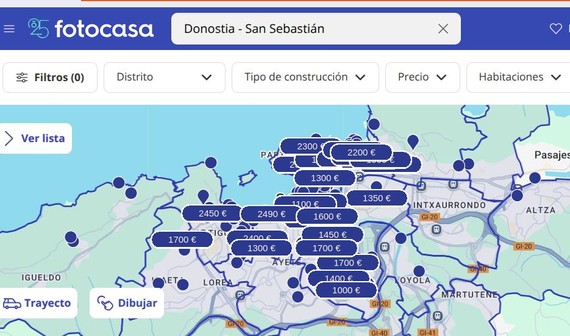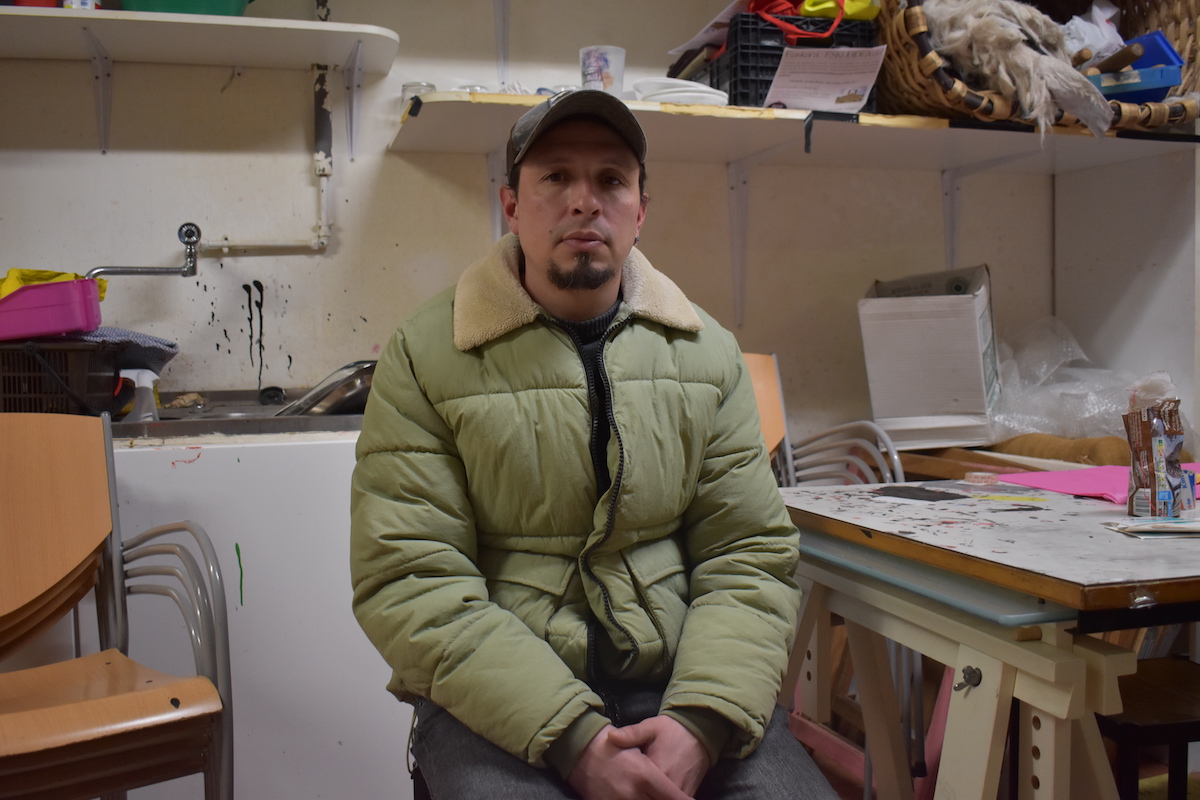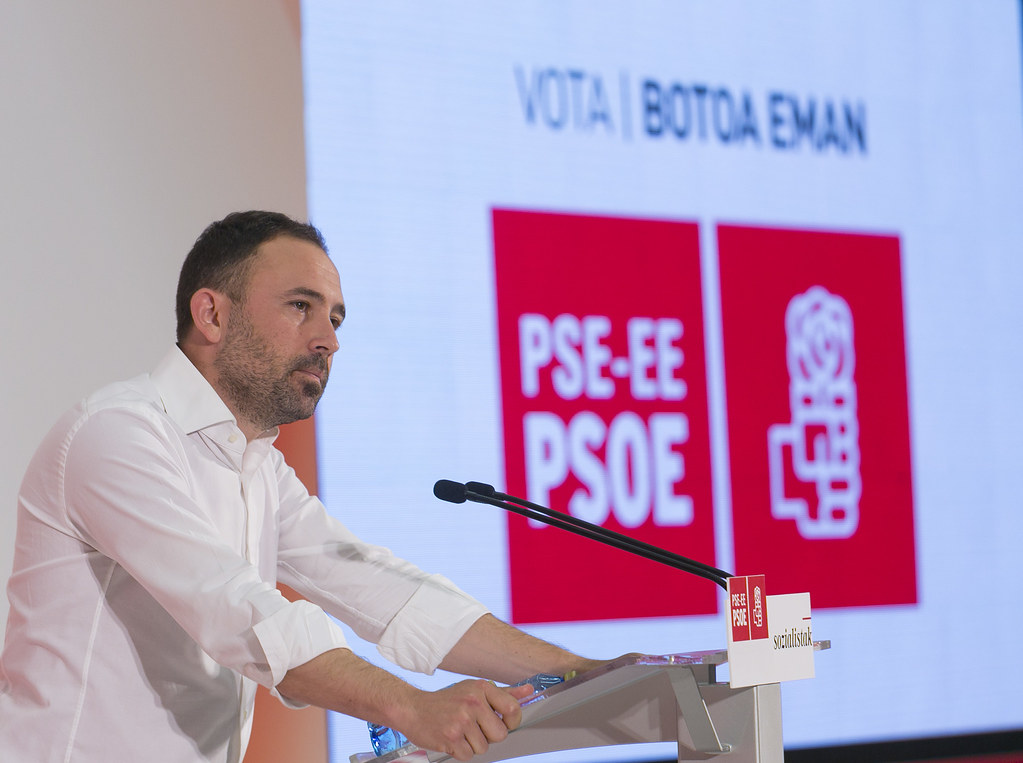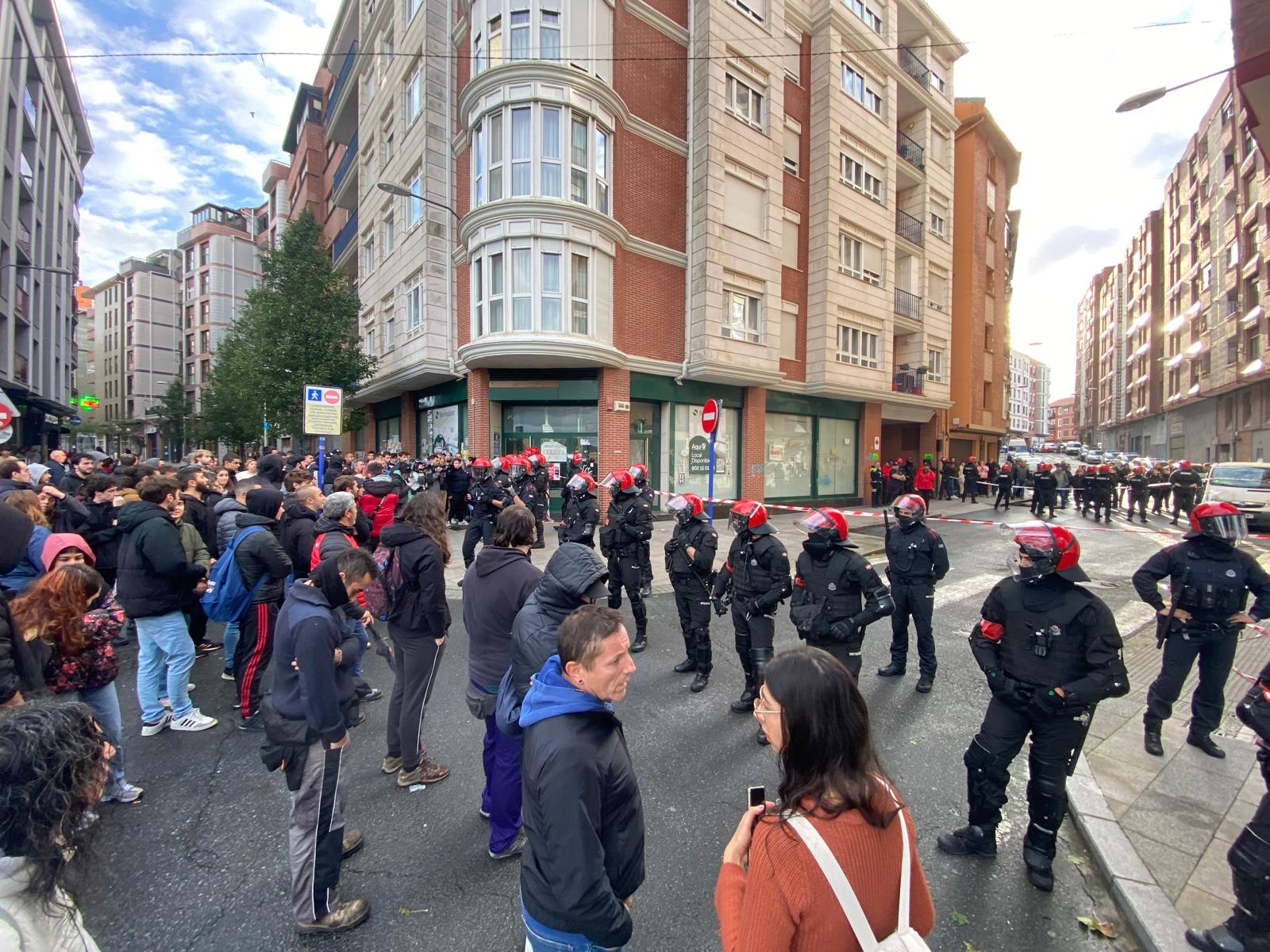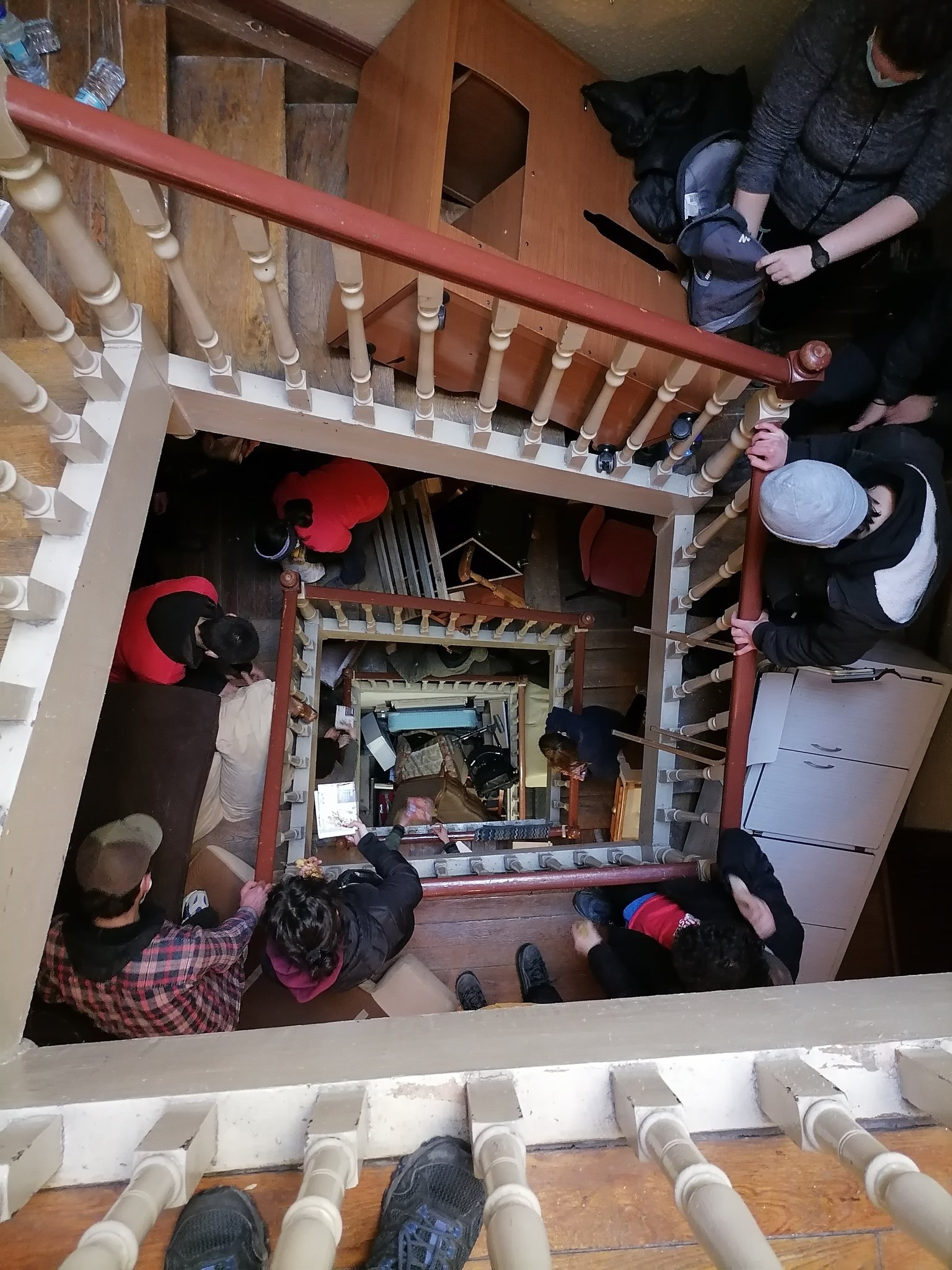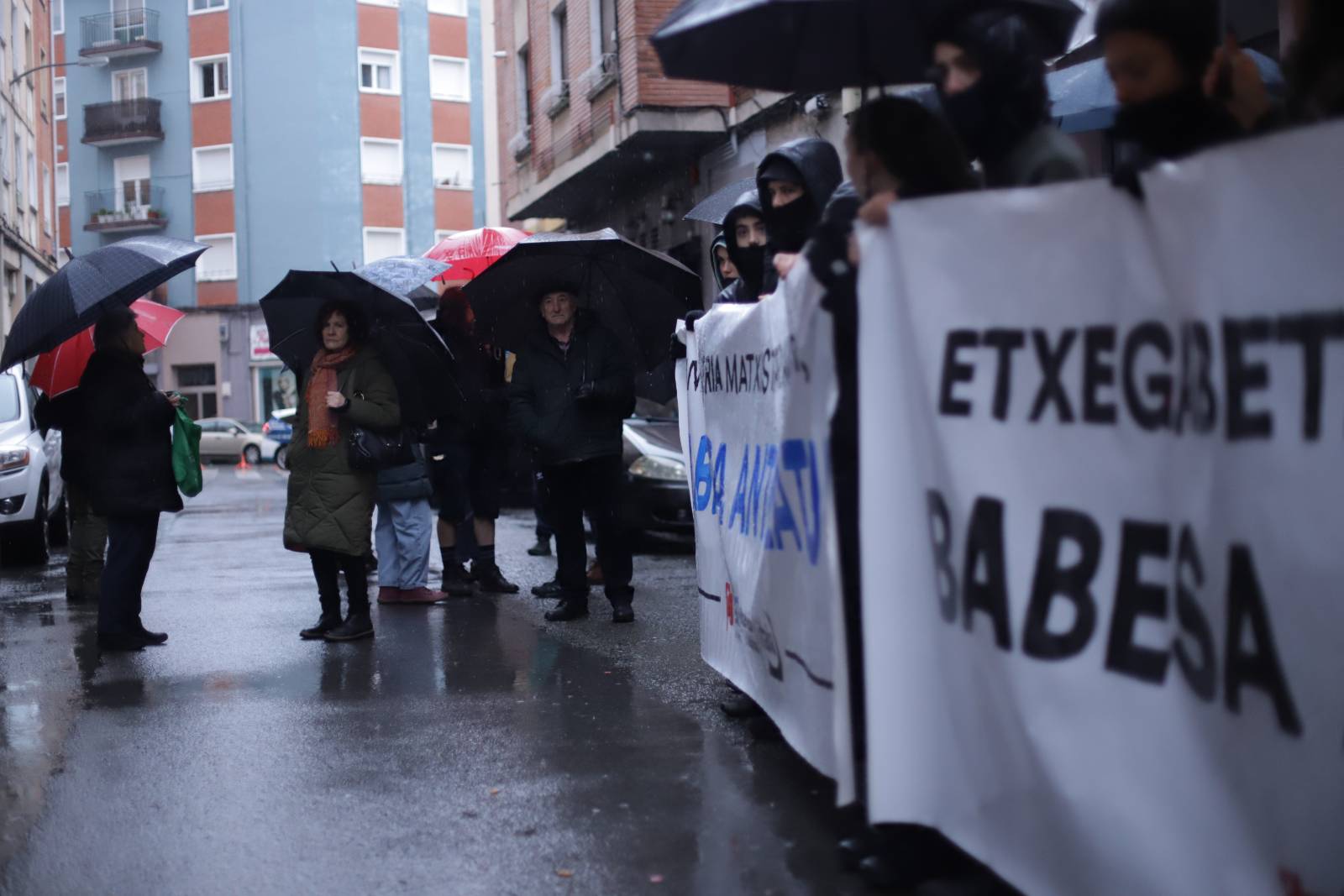Vulture funds will leave the neighbourhood of Benta Berri homeless
- In San Sebastian, the official protective houses in the Benta Berri neighborhood have been in the hands of private companies before construction, and given the impossibility of tenants to buy their homes, politicians have been unable to do anything, because they had lost competences from the beginning. Faced with these kinds of problems in Euskal Herria it is not usual for public institutions to buy these homes, but in Berlin (Germany) they have shown that there are solutions to deal with the speculation of private companies and vulture funds.
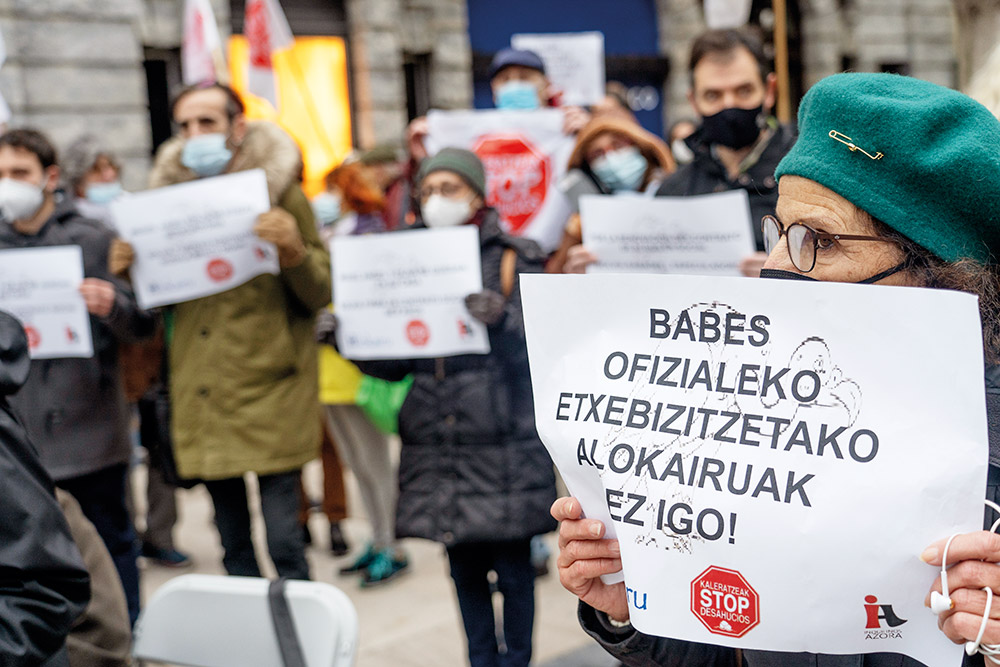
The residents of Benta Berri’s official protective houses have only seven years of protection, and it has been around 23 years since, according to the tenants, they were deceived by the Basque Government. We have to travel to 1994 to get to the bottom of the problem.
That year, the Basque Government published in its Official Gazette of the Basque Country the legal bases for the construction of officially protected housing in Benta Berri and awarded the rights of the plot to the UTE Benta Berri College of Companies for 75 years. This company was responsible for the construction and subsequent management of the housing.
Although land rights have an extension of 75 years, the official protection status of housing is 30 years long, i.e. by 2028 they will no longer be officially protected housing and the homeowners will be able to sell or rent them at the prices they want.
After the awarding of the land rights to the UTE Benta Berri, the propaganda of this new promotion began to be disseminated in San Sebastián and neighboring towns. In the legal bases and in the propaganda sheets of the Official Gazette it was clearly stated that twelve years after the delivery of the keys to the houses, tenants would have the possibility of acquiring the housing. This option brought many families and many individuals closer, because it was a great opportunity: after twelve years of social rent, he bought a house.
The house sweepstakes began in 1998 and members of the association Aloku-Benta Berri indicate that the first problem they had when signing the contract was. In fact, the purchase option indicated in the advertising and legal bases was not covered by the contract.
The deletion of this clause in the contract substantially changed things, as the signatories would not have the possibility to buy housing in the future. Alex Iturrate, a Hire Member, remembers that time as “yesterday”: “We went to the office to say that the purchase clause was missing in the contract and instead of giving reason they started to squeeze us, insisting that if we didn’t sign we would miss the opportunity. That pressure ruined people and other people felt the need to sign the contract.”
Representatives of the Basque Government and the City Hall of San Sebastian made it clear from the outset to the Rent members that they could no longer do anything.
As soon as they entered to live in Benta Berri, they realized the “deceit” and decided to create the abovementioned Aloku-Benta Berri neighborhood association to solve the problem. In fact, this promotion was created and promoted by the Basque Government, but the right to the construction and exploitation of the plot was immediately left to private companies.
That is why the Charter members and the political representatives contacted representatives of the Basque Government and the City Hall of San Sebastian on several occasions, making it clear from the outset that they could no longer do anything. They also tried to talk to the company: “The company did not recognize the Rental as an intermediary and we received no answer. From the beginning they have tried to close the channels of communication,” says Iturrate.
In addition to denouncing the lack of commitment of the Basque Government, they stress that they also have significant problems in communicating with them: “Talking to them is very difficult. To get a meeting we have to follow eleven steps and in the meetings they give us reason, although then they do nothing to improve.”
However, they consider it normal that the company does not respond to the Association of Rental Neighbours: “We are not surprised not to respond, they are private companies and their only goal is to make money. They do anything to achieve that goal, although there are things that are at the limit of legality.”
Vulture funds to aggravate the situation
The construction and operation of Benta Berri’s housing has been managed since its inception by private companies through the UTE Benta Berri. But in 2016, another actor came into play: Fund vulture Blackstone through your real estate company Testa.
The test was merged that year with the UTE Benta Berri and the management was left to them. This has made communication between tenants and company managers very difficult, as Testa has its head office in Madrid and in January of this year they closed the UTE Benta Berri office in the district: “The test continues with the strategy of closing all communication channels. We cannot submit our requests and have also cut the communication by email, because they have erased the address they used before,” the Rental members publicly denounced in January.
In addition to hindering communication, they stress that the entry into play of a vulture fund has increased the “mafia practices on the limit of legality”: “Contracts are being cut and there are more and more problems. The two families of Benta Berri wanted to exchange the house for the number of rooms, and although they both agreed, they did not manage to change,” they say.
As already mentioned, in 2028 Test will be able to rent the homes of Benta Berri at the price you want and tenants say that most residents will have to leave the house: “1998. In the year 2000, Benta Berri hardly existed, and to a large extent we were the ones who made the neighborhood. Rentals are going up a lot, because in San Sebastian, house prices have gone up a lot, and most of us have to move elsewhere.”
In short, the rental companies complain about the attitude of the Basque Government and private companies that manage housing, but they find the latter more understandable. The Basque Government, for its part, considers that it is “absolutely shameful” and the members of the Rent have announced that they will reorganize themselves to turn the situation around: “We have to repress, because if not, this is not going to turn back.”
In Euskal Herria there are many similar cases, as in Pamplona. The Blackstone vulture fund, through the company Testa, has 400 officially protected homes, but recently they lost that condition. Prior to the arrival of the pandemic, the government of María Chivite sat at a negotiating table with representatives of the vulture fund and agreed that tenants would pay a rent of up to 650 euros and that the Government of Navarra would continue to subsidize tenants.
In 2028 Test will be able to rent the homes of Benta Berri at the price you want and tenants say that most residents will have to leave the house
A global problem
The presence and incidence of vulture funds outside our borders is a daily problem. The Blackstone Fund, located behind Benta Berri’s official protective housing, has thousands of homes and buildings in different parts of the world, with a total value of property owned by 411 billion dollars.
At the end of 2018 there was a situation similar to that of Benta Berri’s official protective housing in Berlin, but with a very different outcome. Deutsche Wohn, with BlackRock vulture background, offered in November 2018 the purchase of 670 homes located on the well-known Karl-Marx Allee Avenue. This quickly disturbed the neighbors and protested to prevent the purchase from occurring.
After several weeks of protest by the tenants of Karl-Marx–Alle, in early January 2019 the company Deutsche Wohn retired and the Berlin State Senate decided to purchase these homes to expand the public housing stock. The Ministry of Finance purchased 670 homes from this famous avenue for about 90-100 million euros. To learn more about this purchase, ARGIA spoke to Eva Henkel, press officer of the Berlin Ministry of Finance.
With the unification of Germany and the liberalization of the system, the homes of Karl-Marx Alle were handed over to a public company, but were soon purchased by private companies. According to Henkel, the homes were “in a regrettable situation” and needed private investment to improve. Rents increased compared to those in the German Democratic Republic at the time, but have remained stable to date.
The offer made by Deutsche Wohn in 2018 drew the attention of the Berlin Senate: “The 2018 private sale was ill-designed by Deutsche Wohn’s company and it became clear to us that they would not respect the interests and rights of tenants. That is why the Senate intervened. Our Ministry asked for legal clarification on the rights and privileges of tenants and through lawsuits we managed to guarantee the rights of tenants. This led to a decrease in the interest of private investors, who eventually bought housing from a public real estate company in Berlin,” says Eva Henkel.
In 2021, the State of Berlin has taken a step further in the expansion of the public housing stock. In fact, on 26 September a referendum was held in the German capital and the State approved to initiate the procedure of buying 240,000 private homes, with a vote in favour of 56.4 per cent, which represents 15 per cent of the homes in Berlin. The purchase will cost around EUR 13.7 billion.
All these purchases, however, have a small print, and it is the Senate itself that says that the situation is not going to change much. In connection with the purchase of 670 homes at Karl-Marx Alle, Henkel says: “This purchase is perceived by many as a great victory, but it was a great cost to the state. That is why we should not have this case as a model for collectivization. In fact, the tenants of these buildings are sectors that live comfortably and, in fact, do not need as much help from the public body. There are cases in which the State has purchased housing where the most vulnerable sectors live, and these are the ones that have to be the model for the future.”
In fact, the housing situation in Berlin is far from perfect, although greater efforts are made than elsewhere to facilitate access to housing for the most proletarian sectors of society. According to a 2018 study, in Berlin there are about 60,000 people without fixed residence, of whom between 2,000 and 6,000 are people without hogar.Cada The state has its own housing policy, and although those of some
are more progressive than those of others, the fact of having a fixed and dignified residence for the most vulnerable people in society remains a headache.
Karl-Marx–Allee
After the Second World War, the German Democratic Republic made a great effort to rebuild the city and the standard of this reconstruction project was the Karl-Marx–Allee Avenue, initially called Stalinallee, built between 1952 and 1960.
During the years of the German Democratic Republic the rents were very low and with the German union the liberalization of the system came, so that the dwellings fell into private hands and the rents increased considerably.

Aljeriatik datoz Mohamed eta Said [izenak asmatuak dira], herri beretik. “Txiki-txikitatik ezagutzen dugu elkar, eskolatik”. Ibilbide ezberdinak egin arren, egun, elkarrekin bizi dira Donostian, kale egoeran. Manteoko etxoletan bizi ziren, joan den astean Poliziak... [+]
Espainiako hedabideetan aurkitu dugu albistea, salaketa egin dutela Fotocasa eta Idealista etxebizitza-atarien kontra, prezioak manipulatzen dituztelakoan. Salaketan ez dugu manipulazioaren deskribapen zehatzik aurkitu, baina Ameriketako Estatu Batuetan agertu den salaketa... [+]
Ez da gauza berria politikari profesionalak gizarteko arazoak estaltzeko ahaleginetan ibiltzea. Azkenaldian Denis Itxaso -EAEko Etxebizitza sailburua- entzun dugu etxegabetzeei garrantzia kenduz eta aditzera emanez gurean bazterreko fenomenoa direla; eta Begoña Alfaro... [+]
Azpeitiko Udalak etxebizitza hutsei ezarritako kanona abian jarri berritan –eta Euskadi osora zabal daitekeela jakinda–, etxebizitza horien jabeen eta eskuineko alderdien kexak irakurtzen eta entzuten hasiko gara. Jabetzarako Eskubidearen inguruko mantra horiek... [+]
Azora putre funts alokairua igo eta mantentze lanak alde batera utzi ditu, Isaac Lagos eta bere familia etxebizitza uztera behartuz. Kaleratzearen aldeko epai bat jaso berri du maizterrak.
Plataformak "atzerapausotzat" hartu du Eusko Jaurlaritzako Etxebizitza eta Hiri agendako sailburu Denis Itxasok berriki iragarri izana lurzoru urbanizagarrietako etxe babestuen proportzioa %75etik %60ra jaistea. Pradales agintera iritsi zenetik alokairu soziala eskatzen... [+]
Etxera itzuli ahal izan diren arren, joan den azaroan kaleratu zuten Astrabuduko familia berriz ere arriskuan dago. Uribe Kostako Etxebizitza Sindikatuak salatu du mailegu-enpresa berriz ere saiatzen ari dela kanporatzea gauzatzen, oraingoan, desokupazio-enpresa bat... [+]
Azken boladan gero eta gehiago entzuten dugu gazte askok etxebizitza erosteko ahalmenik ez dugula. Batzuetan, badirudi ez dagoela beste gairik; egia da gai serioa dela. Niri neuri ere, 31 gertu izan arren, oraindik pixka bat falta zait neurea izango den etxebizitza lortzeko... [+]
Azken egunak garrantzi handikoak izan dira Bartzelonan, etxebizitzaren aldeko mugimenduarentzat eta espekulatzaileen aurkako borrokarentzat. Urtarrilaren 28an, polizia-armada batek Raval auzoko Massana Zaharrari [zentro sozial okupatua] eraso egin zion goizaldean, aurrez abisatu... [+]













